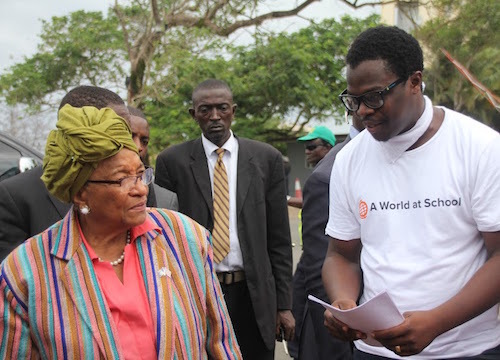
“The story of little Angel – out of school and married to a 40-year-old man – inspires me to stand up for millions of children”
Barriers to education, Child marriage, Girls' education, Global Youth Ambassadors, Right to education
Moses Browne, a Theirworld Global Youth Ambassador from Liberia, tells how investment and new thinking are needed if his country's children are all to go to school and fulfil their potential.
In August 2013, I travelled to a small place called Zedyou Town, 10 kilometres away from Buchanan City, Grand Bassa County. Tears filled my eyes when I met little Angel Kilby (not her real name), who was 15 years old at the time.
She told how she lived with her parents and has never been to school. But she’s eager to go to school. Her parents forced little Angel to marry a 40-year old man, a vegetable farmer in the same village.
Angel’s mother told me she must keep up their traditions before anything else – and school was not a priority. I was grief-stricken. I couldn’t believe my eyes. I am sure this is happening in other villages around Liberia – including right here in Monrovia, the capital city.
Liberia, the oldest country in Africa, is still recovering from decades of instability and economic breakdown. It’s a situation which has negatively impacted the governance process, decreased productivity and limited progress in the economy.
When you read the newspapers every morning, you watch the television and listen to news on radio, you are sometimes left with no hope, especially in the area of education. Liberia needs a successful policy implementation for education.

The mandate of the Ministry of Education is “to provide quality education for all and prepare future leaders who are capable of handling the task of nation building, protecting our national heritage and enhancing the socio-economic growth and development for the sustenance of the Liberian state”.
However, funding for the sector has been very low, which has resulted in a weak system over the last decade.
It is no secret that more than 70% of our schools were destroyed during the country’s bloody civil war and most school-age children were denied the opportunity of acquiring basic education and enrolment. Many of our teachers were killed and others fled for fear of being killed in the war.
Today the war is over and Liberia has enjoyed 11 years of sustained peace. President Ellen Johnson Sirleaf has won two successive elections and the democratic process is well on course. In her inaugural address during her first term, she promised to institute policies and reform strategies that would enhance rapid growth and development for Liberia.
However, today there are many children in the streets of Liberia selling cold water, boiled eggs and candies. These kids are yet to sit their first exams and there are many young people, former combatants who do not have the opportunity to go to school.
We can’t afford to have a country that is so yearning for development and progress to have such a low level of literacy rate – around 25% is unacceptable. It will be difficult for those who are illiterate to contribute meaningfully to the development of the country.
Even though we see children going to school every morning, we are not sure whether they are even acquiring the requisite skills and training to prepare them for the future challenges. Global Youth Ambassador Moses Browne
Today, we have have a $16 billion investment portfolio in Liberia. There are several concession companies, international development organisations and non-governmental organisations that are in a serious search for qualified technicians, specialists and experts to work in different sectors.
However, the majority of people cannot venture into the employment market simply because they lack the skills and capabilities to meet the demands these companies are making.
We recognised the progress under President Ellen Johnson Sirleaf’s leadership. She is enjoying two terms of uninterrupted peace as Africa’s first female president. Liberians are yet to experience a major change in their lives after more than 11 years of sustained peace and stability.
This government has introduced several policies and programmes aimed at reviving the economy, rebuilding damaged infrastructures such as roads, bridges, eradicating corruption, improving healthcare, increasing employment, and so on.
But progress is still very slow, as evidenced by the economic decline and high cost of living.
Even though we see children going to school every morning, we are not sure whether they are even acquiring the requisite skills and training to prepare them for the future challenges.
Little Angel’s story – and that of so many other young people in Liberia, Africa and the world at large – inspires me to stand up for the millions of children who are kept out of school because of poverty, early marriage, child labour and different forms of discrimination.
There is also a lack of governance structure, little funding to the education sector and lip service from those in authority, who are denying us the opportunity to advance our education.
I strongly believe the government must invest much more in quality education. The budget must allot more for the provision of learning materials and resources to build better schools and provide scholarships to deserving students.
More news

